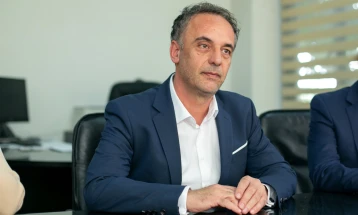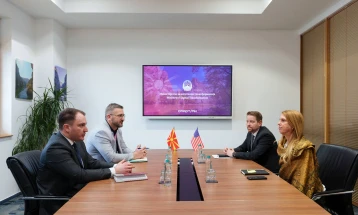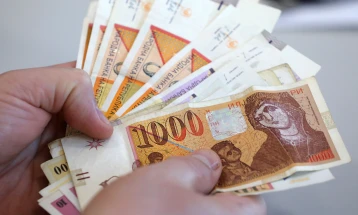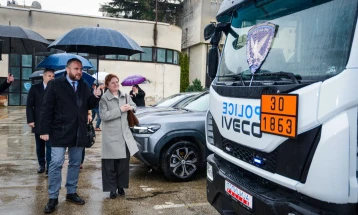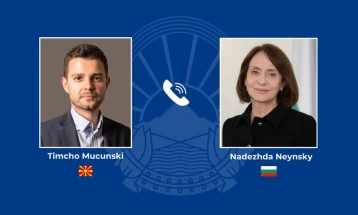NATO membership greatest contribution to security, actively participating in discussions and decision-making
- The Army House in Skopje hosted on Thursday a debate on "Five Years of NATO Membership: Achievements, Perspectives and Challenges", organized by the Diplomatic Club-Skopje and the Association of Veterans and Reservists in Defense and Security.
- Post By Nevenka Nikolik
- 14:50, 13 March, 2025
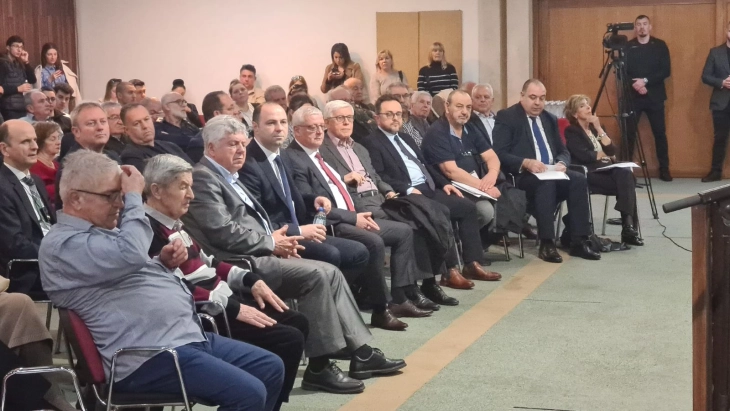
Skopje, 13 March 2025 (MIA) - The Army House in Skopje hosted on Thursday a debate on "Five Years of NATO Membership: Achievements, Perspectives and Challenges", organized by the Diplomatic Club-Skopje and the Association of Veterans and Reservists in Defense and Security.
Some of the main messages conveyed at Thursday's event were that NATO membership is the greatest contribution to our security and stability, the strongest guarantee for the protection of territorial integrity and sovereignty, and an important prerequisite for the well-being of citizens. Participants in the debate pointed out that the country is no longer an object in geopolitical discussions, but it is now a subject that actively participates in discussions and decision-making on all issues. In addition, it was noted that the Ministry of Defence currently has the largest budget in decades, and it is important for the Army to modernize, for the country to modernize its capacities and invest in human potential.
Minister of Defence Vlado Misajalovski stressed that the country has two strategic goals, NATO and the EU.
"After 30 years, we are still outside the EU family, we are still in the waiting room. We have made many sacrifices. As a state, we have given much of our identity, a change of name, a change of flag, a change of banknotes, and many concessions over the recent years. Yes, we are now equal in NATO, but we must not forget that we have been a serious member state since 2008. Our place was in NATO even then," said Misajalovski.
He pointed out that the country will fulfil its obligations to NATO, noting that 32 percent of this year's budget is directly allocated for modernization.
"We are facing complex times. Unfortunately, there has been more than three years of war on European soil. And not only on European soil, but also beyond the borders of the continent, we have a worrying security situation. What is important for us as a state is to achieve a target of over 2% of GDP, and we are achieving that at the moment. We should also discuss regional approach, we should discuss what is most necessary for our Army, but also help all our allies and friends. In order to be one big family, we need to achieve all those actions that the big countries in NATO are taking," Misajlovski added.
He said all funds are regularly paid to all soldiers, all officers and this will continue. He noted that the Ministry will also allocate funds for capacities, and modernize in parallel.
"We currently have the largest budget in the Ministry of Defence in decades, and we will fully commit to assisting in human resources, as well as improving our capacities. A large number of our capacities, that the Ministry of Defence has, but also in the Army, are unfortunately in poor condition. If we are to be equal at the table and sit with other member states, we should allocate funds for these facilities. In accordance with NATO needs, we should allocate 20 percent of our budget for modernization. Indeed, this year there will be many projects that we will implement," said the Minister.

Retired major-general Pavle Arsoski pointed out that NATO membership as a strategic goal has always had strong support among citizens and a broad non-partisan, interethnic and social consensus.
"The contribution to international operations is in the spirit of the state's strategic commitment to contribute to global peace and security, and it is yet another confirmation of the readiness to share challenges as a full-fledged NATO member state. Macedonia, as one of the newer members of the Alliance, is already meeting the targets that NATO set at the Wales summit in 2014. At the time, NATO members committed to spending at least 2% of GDP for defence in the next decade, and meet the 20% of annual defence expenditure guideline on major new equipment and modernization of defence forces," Arsoski said.
He noted that last year, the country has invested 2.05% of GDP in defence, i.e. EUR 327 million. For comparison, in 2023, 1.85% of GDP was allocated for defence, and in 2022 it was 1.57% of GDP.
Arsoski said NATO's role in supporting Ukraine at these critical times is of crucial importance, noting that the country sympathizes with the Ukrainian people in the aggression by Russia.

"The new U.S. administration for the past two months has been insisting on a significant increase in defence investments and capabilities by European NATO members, announcing a reduction in U.S. presence on the European continent, persistently and decisively taking measures to quickly end the war in Ukraine, imposing tariffs, and we have a trade war in the making... All of these are developments that on the one hand cause concern, but on the other hand initiate action," Arsoski noted.
Retired major-general Ilija Nikolovski, said the country's accession to NATO represents an important and historic act in achieving our strategic goal, because for us as a small country, which is located at a very important, sensitive geostrategic position, achieving this goal is of particular importance.

"The country's accession to NATO is an important act because our immediate environment faces many uncertain challenges, such as international terrorism, arms smuggling and proliferation, hybrid threats and cyberattacks. Therefore, together with the other NATO members, united together, we can successfully fight against these uncertain threats. Of course, the greatest satisfaction is the official accession of the Republic of Macedonia to NATO. Our country has become part of the most powerful military-political alliance in the world, and the Macedonian flag flies together with the flags of the United States, Great Britain, Germany, France and other democratic world powers," said Nikolovski.
He underlined that NATO membership is both a political and security issue for all citizens. This, he added, is a process that deeply and fundamentally affects overall life, the future of every citizen of the country, as well as future generations.
"By joining NATO, we guarantee once and for all the security of our borders, joining the most powerful alliance in the world, as equals with the great powers. As full and equal members of NATO countries, we make geostrategic decisions for our future and the future of our children," said Nikolovski.
Photo: MIA


